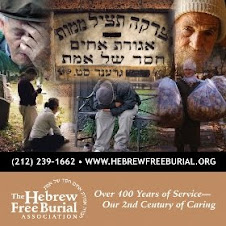Today's NYTimes featured a story about the autopsy room in a NYC morgue. Obviously, this is an article that saddens me to read, as Jewish law generally speaking prohibits autopsies. I am raising attention to the article for the following sentences at the beginning of the last paragraph.
There was an overstock of death the other day, as the potter’s field was frozen and several of the bodies had been held ... They would be buried when the earth had finally thawed.
Neither snow, nor rain, nor heat, nor gloom of night...
